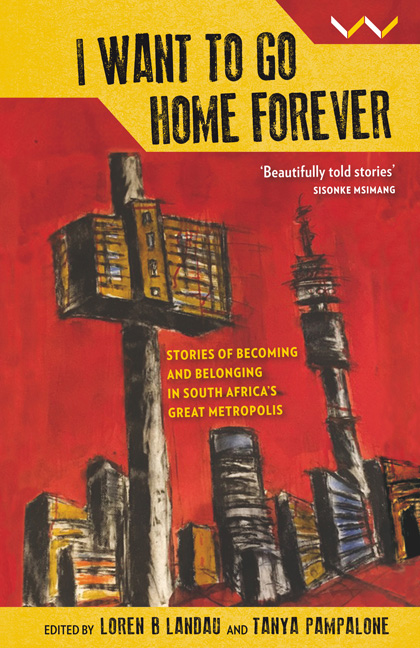Book contents
- Frontmatter
- Dedication
- Contents
- Foreword
- Preface
- Maps
- Introduction
- 1 A bed of his own blood: Nombuyiselo Ntlane
- 2 This country is my home: Azam Khan
- 3 On patrol in the dark city: Ntombi Theys
- 4 Johannesburg hustle: Lucas Machel
- 5 Don't. Expose. Yourself: Papi Thetele
- 6 The big man of Hosaena: Estifanos Worku Abeto
- 7 Do we owe them just because they helped us?
- 8 Love in the time of xenophobia: Chichi Ngozi
- 9 This land is our land: Lufuno Gogoro
- 10 Alien: Esther Khumalo*
- 11 One day is one day: Alphonse Nahimana*
- 12 I won't abandon Jeppe: Charalabos (Harry) Koulaxizis
- 13 The induna: Manyathela Mvelase
- Timeline
- Glossary
- Selected place names
- Contributors
9 - This land is our land: Lufuno Gogoro
Published online by Cambridge University Press: 29 May 2019
- Frontmatter
- Dedication
- Contents
- Foreword
- Preface
- Maps
- Introduction
- 1 A bed of his own blood: Nombuyiselo Ntlane
- 2 This country is my home: Azam Khan
- 3 On patrol in the dark city: Ntombi Theys
- 4 Johannesburg hustle: Lucas Machel
- 5 Don't. Expose. Yourself: Papi Thetele
- 6 The big man of Hosaena: Estifanos Worku Abeto
- 7 Do we owe them just because they helped us?
- 8 Love in the time of xenophobia: Chichi Ngozi
- 9 This land is our land: Lufuno Gogoro
- 10 Alien: Esther Khumalo*
- 11 One day is one day: Alphonse Nahimana*
- 12 I won't abandon Jeppe: Charalabos (Harry) Koulaxizis
- 13 The induna: Manyathela Mvelase
- Timeline
- Glossary
- Selected place names
- Contributors
Summary
Lufuno Gogoro was born in a village in Venda – one of ten bantustans or ‘black homelands’ established by the apartheid government, and which now forms part of Limpopo province. In 1993, he left his grandmother to live in Johannesburg with his mother, who was a domestic worker. Along with his mother and other community members, they occupied land in Soweto that later would be known as Freedom Park. A community leader actively involved in many political movements and community projects, Gogoro served as the spokesperson for the Greater Gauteng Business Forum, an organisation made up of informal businesses that has called for the closure of small, foreign-owned shops operating in townships across the province.
Growing up in Venda, I did almost everything a rural kid would do. We had a mud house and you could see the poverty; it was there. You know, a simple thing like bread was very scarce, so you would only get to enjoy a loaf of bread once or twice a year. You would survive on pap and morogo and cabbage.
So you grow up without anything; we could not afford toys to play with. If you played soccer, you played with your bare feet as we could not afford soccer boots. I would even go to school barefoot during the winter. But back then we thought that was a normal life. Most of the things we experienced were things that other families experienced. We didn't care much about it then, but when you look back you realise a lot of things were a challenge.
In school, we didn't get treated the same as someone who was from a family that was better off. I remember my three best friends, we all shared the name Lufuno. They were not beaten or sent to the principal's office. But others like me, they were beaten and even made to do manual work like scrubbing the floors or watering the garden. It is what inspired me to become involved in community debates.
When I was in standard six, I realised that we were not being treated well by the teachers; sometimes they would just skip a class and sit outside. I organised a strike that lasted the whole week.
- Type
- Chapter
- Information
- I Want to Go Home ForeverStories of Becoming and Belonging in South Africa's Great Metropolis, pp. 124 - 137Publisher: Wits University PressPrint publication year: 2018



